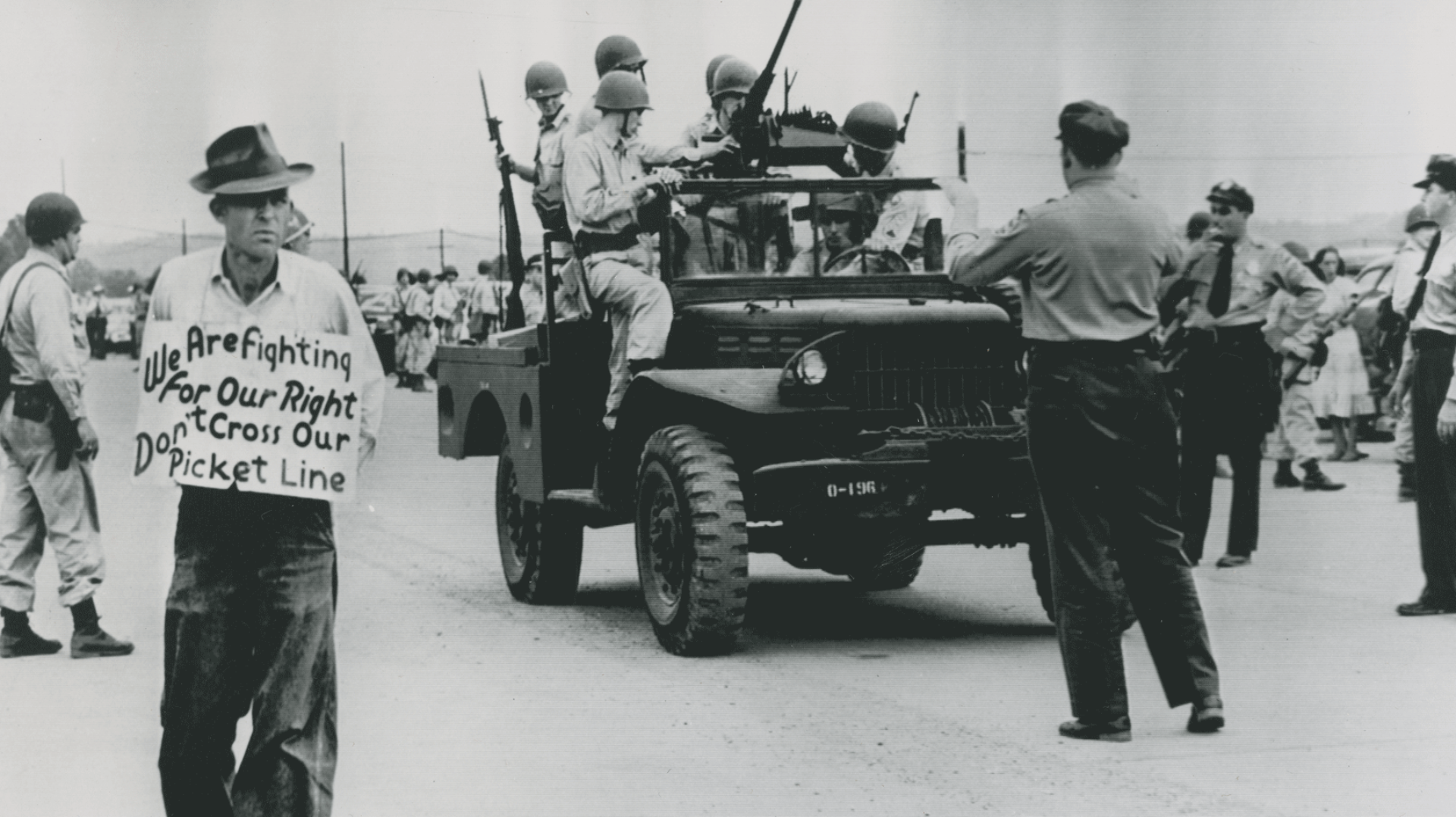Don’t Cross Our Picket Line: Operation Dixie and the TWUA-CIO Local 1054 Strike of American Enka
(Working Title)
A story from the labor movement’s failed campaign to organize the South after World War II. In the segregated and growing industrial city of East Tennessee’s Morristown, a new rayon facility employs 700 workers. They walk out on strike March 28, 1950. The documentary film reanimates the five month long strike from affidavits submitted to a congressional investigation after the Governor of Tennessee sends in the National Guard.
Don’t Cross Our Picket Line adopts a film noir aesthetic as a reflection of the time period and builds a collaboration of community performers to share the workers’ tales of violence and racial injustice that US senators and labor journalists interpret as a company-state conspiracy to break the union. Through such lens, the documentary examines then new labor legislation and explores the current direction of the southern labor movement as it seeks greater democracy in the workplace.
Chicago Daily Tribune, May 30, 1950, p. 1. (Newspapers.com)
New York Post, June 5, 1950, p. 5. (The New York Public Library)
The Asheville Citizen, June 23, 1950, p. 1. (Newspapers.com)
CIO News, June 26, 1950, p. 8. (University of Maryland, College Park)
Textile Labor, July 8, 1950, p. 1. (Wisconsin Historical Society)

Brian Myers
Producer/Director
Brian is a nonfiction filmmaker with an MFA in Social Documentation. He examines social inequities in underrepresented working class communities through documentary, journalism and community collaboration. His work includes Far From Kawthoolei (2020), Land & Freedom: Talking Food Systems (2014) and Speak City Heights (2011-2018). Contact: myersbam(A)gmail.com

Jennifer E. Brooks
Advisor
Jennifer Brooks is a native of Knoxville, Tennessee, received her Ph.D in History from the University of Tennessee, and currently is Professor of History and the Director of Graduate Studies in History at Auburn University. Her first book is Defining the Peace: World War Two Veterans, Race, and the Remaking of Southern Political Tradition (University of North Carolina Press, 2004). Her second book is Resident Strangers: Immigrant Laborers in New South Alabama (Louisiana State University Press, 2022). Other work has appeared in the Journal of Southern History, Labor: Studies in Working Class History, Journal of American Ethnic History, and Southern Cultures. She is a past president of the Southern Labor Studies Association and currently is working on Striking Out: A Graphic History of Southern Labor in the Cold War, a narrative that tells the American Enka story through original photographs, interviews, and documents.
Danielle Phillips-Cunningham
Advisor
Dr. Danielle Phillips-Cunningham is an associate professor of Labor Studies and Employment Relations at Rutgers University where she teaches courses about race, gender, and labor histories. She is the author of Putting Their Hands on Race: Irish Immigrant and Southern Black Domestic Workers and recipient of the National Women’s Studies Association’s Sara A. Whaley Book Prize for outstanding monographs on women’s labor history. Phillips-Cunningham’s forthcoming book “A Tower of Strength in the Labor World”: Nannie Helen Burroughs and her National Training School for Women and Girls is under contract with Georgetown University Press. Phillips-Cunningham’s book is supported by the African American Intellectual History Society’s C.L.R. James Fellowship, American Philosophical Society’s Franklin Research Grant, and Texas Woman’s University’s Creative Arts and Humanities Program. Phillips-Cunningham is a co-principal investigator of Quakertown Stories, an African American public history and curriculum project funded by the National Endowment for the Humanities. As a fellow of the OpEd Project’s Public Voices of the South, Phillips-Cunningham has written op-eds about African American women’s labor organizing history.
Jon Shefner
Advisor
Jon Shefner is Professor and former Department Head in the Department of Sociology at the University of Tennessee – Knoxville. He has researched and written about social movement and labor organizing, immigration, globalization and austerity, and civil society. His books include The Illusion of Civil Society: Democratization and Community Mobilization in Low Income Mexico (Penn State University Press, 2008), Global Connections and Local Receptions: New Latino Immigration to the Southeastern US (University of Tennessee Press, 2009, edited with Fran Ansley); and Why Austerity Persists (2019, Polity Press with Cory Blad). He has done fieldwork and worked collaboratively with movements, labor, and community organizations in Mexico, Ecuador, New Orleans, LA, and Knoxville, TN. His current research examines movements and organizations across the US South to determine what kinds of organizing tactics work best in which contexts. Throughout his scholarly career he simultaneously worked as organizer and leader in a variety of progressive movements and organizations.
T.R.C. Hutton
Advisor
T.R.C. Hutton (PhD, Vanderbilt 2009) is an associate professor of history and Appalachian studies at Glenville State University in Gilmer County, WV. He is the author of Bearing the Torch: A History of the University of Tennessee, 1794-2010 (2022) and Bloody Breathitt: Politics & Violence in the Appalachian South (2013), and he is currently working on a book about the mine guard system in Appalachia. His essays have appeared in Jacobin, Tribune Magazine (UK), and the US Intellectual History blog.The industrial ruins of American Enka Corporation, Lowland, Morristown, TN (2022)
Fiscally sponsored by Southern Documentary Fund.








